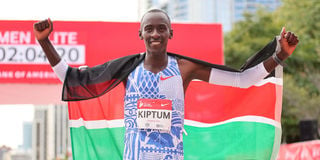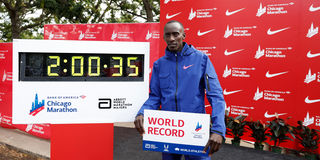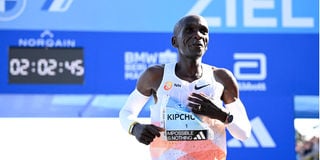Premium
Inside Kiptum's master plan that could change marathon history

Kelvin Kiptum of Kenya celebrates after winning the 2023 Chicago Marathon professional men's division and setting a world record marathon time of 2:00.35 on October 08, 2023 in Chicago, Illinois.
What you need to know:
- Kiptum, who made his first appearance at the 2019 Rotterdam Marathon as a pacer, said he is keen on returning to the course and running a fast time
- The NN Rotterdam Marathon confirmed in a statement on Wednesday said that Kiptum will go for the two-hour limit
- Former marathon world record holders Paul Tergat and Patrick Makau and veteran distance running coach David Letting have tipped Kiptum to go under two hours, having exhibited potential, talent and the will
When Kelvin Kiptum lined up on the streets of Chicago on October 8 this year, there was no indication that he was about to pull off something extra-ordinary.
However, the blistering pace at which the 23-year-old attacked Eliud Kipchoge’s world record, especially in the last phase of the race, left the world mesmerised.
Upon Kiptum crossing the finish line, Kipchoge’s marathon world record of two hours, one minute and nine seconds was in tatters, improved by a massive 34 seconds, with Kiptum running a sublime 2:00:35.
It was the first time a world record was being set in Chicago since Moroccan Khalid Khannouchi’s exploits of 2:05:42 on October 24, 1999.

Kenya's Kelvin Kiptum celebrates winning the 2023 Bank of America Chicago Marathon in Chicago, Illinois, in a world record time of two hours and 35 seconds on October 8, 2023.
Then the athletics world went into a frenzy with top commentators fantasizing, analyzing and discussing when and how a competitive marathon would be run in under two hours, in normal conditions.
Kiptum’s phenomenal performance has now put the world on the cusp of this historic moment, Kenya’s new sensation having run three of the top six fastest times in the marathon, with the world record just being the icing on the cake.
In fact, before Chicago’s most significant moments, Kipchoge had taken a shot at his own world record for the second time, only to produce the fifth fastest time of 2:02:42 in Berlin on September 24 this year.

Kenya's Eliud Kipchoge smiles after crossing the finish line to win the men's race of the Berlin Marathon on September 24, 2023 in Berlin, Germany.
Well, it was only a matter of time that the much-awaited declaration of 'sub-two hours’ was made as some of the fastest courses in the world were sought.
Kipchoge’s “No Human is Limited” phrase took the world by storm, but Kiptum’s “There is no limit to human energy” mantra could completely change marathon running landscape in five months’ time.
While Kipchoge made the world believe, Kiptum has now put the world on edge by letting the cat out of the bag in the Netherlands on Wednesday: He hopes to rewrite marathon history books at NN Rotterdam Marathon on April 14, next year when he attempts what was deemed as impossible and a wild dream... running a competitive marathon in under two hours.
“I will try at least to beat my world record here. I know I’m capable of doing that, if my preparation works out well and the conditions are OK,” said Kiptum before hitting the nail on the head.
“And in that case, I will get close to the sub-two hours barrier, so why not aim to break it? That might look ambitious, but I’m not afraid of setting these kinds of goals. There’s no limit to human energy,” said Kiptum.

Kenya's Kelvin Kiptum celebrates winning the 2023 Bank of America Chicago Marathon in Chicago, Illinois, in a world record time of two hours and 35 seconds on October 8, 2023.
Kiptum, who made his first appearance at the 2019 Rotterdam Marathon as a pacer, said he is keen on returning to the course and running a fast time.
“I want to return here to run fast... This flat course lends itself to fast times and the enthusiastic masses of people along the road push us forward,” said Kiptum, adding that he would like to be part of the rich history of this marathon.
The NN Rotterdam Marathon confirmed in a statement on Wednesday said that Kiptum will go for the two-hour limit.
This will be the first time someone will try to break the two-hour mark even though it has always been in Kipchoge’s mind and plan since his ambitious venture at Nike Breaking2 project in 2017 at the Monza Formula One circuit in Italy (he ran 2:00:25), and the eventually successful INEOS 1:59 Challenge in 2019 (1:59:40).
The Vienna breakthrough came after he handed Kenya its second Olympic marathon title at Rio 2016 Olympic Games.
Kipchoge, along with Eritrea’s Zersenay Tadese, then the half marathon world record holder and Ethiopia’s Lelisa Desisa, the two-time Boston Marathon champion, attempted the first sub-two-hour assisted marathon in the Nike Breaking2 project on May 6, 2017, at the Autodromo Nazionale – Monza’s Formula One racetrack near Milan, Italy.
All three runners ran a test two months before the Monza attempt in the race where Kipchoge finished in 2:00:25 as Tadese and Dedisa slowed and finished far behind.
Kipchoge would then go on to break the marathon world record for the first time, winning in Berlin in 2018 in 2:01:39, erasing Dennis Kimetto’s time of 2:02:57 set on the same course in 2014.
In May 2019, a few days after his London Marathon win in a course record time of 2:02:37, Kipchoge announced another take on the sub-two-hour marathon, the INEOS 1:59 Challenge.

Eliud Kipchoge (in white singlet) runs flanked by pacesetters during the INEOS 1:59 Challenge at Prater Park in Vienna, Austria on October 12, 2019.
Kipchoge clocked 1:59:40 during the race that was staged at Vienna’s Prater Park on October 12, 2019, becoming the first person in recorded history to break the two-hour barrier over a marathon distance.
However, the time could not be ratified as a world record since he had no other competitors, and with the assistance of fuel and hydration on demand, and in-out pacemakers.
Former marathon world record holders Paul Tergat and Patrick Makau and veteran distance running coach David Letting have tipped Kiptum to go under two hours, having exhibited potential, talent and the will.
“The key thing is that faith can move mountains and by setting that target, Kiptum has the faith and knows what he is doing.
“Faith supersedes everything and Kiptum has shown potential, talent and capacity to run faster,” said Tergat, who proved the world wrong when he became the first man to run under 2:05 when he clocked 2:04:55 to win the 2003 Berlin Marathon in world record time.
“No one then thought anybody could run a marathon under two hours and five minutes and I did that,” said Tergat, a Lieutenant Colonel at Kenya Defence Forces.
“A good mental framework enables the athletes to face any conditions in a race.”
Having followed Kiptum’s progress, Tergat said that Kiptum will reign in the marathon in many years to come.
“I am happy that Kiptum has shown consistency and knows what he is doing. Any athlete running a marathon under two hours and 10 minutes isn’t a fun runner but a committed professional,” explained Tergat, who is also the National Olympic Committee of Kenya (NOC-K) President.

Kenya's Kelvin Kiptum celebrates winning the 2023 Bank of America Chicago Marathon in Chicago, Illinois, in a world record time of two hours and 35 seconds on October 8, 2023.
Tergat noted that a marathon is a full-time job with no shortcuts.
“This is a full-time job where you train two times a day around the year...there is no holiday of fun,” said Tergat, who commended Kenyan athletes for their sacrifices.
Makau, who made his marathon debut in Rotterdam in 2009 finishing fourth before winning the race in 2010 in 2:04:48, said Kiptum’s handlers did a good job in identifying the right course.
“Rotterdam is a fast course especially from 30km where it’s flat and straight,” said Makau, who made history as the second Kenyan after Tergat to set a world record with victory in 2011 Berlin in 2:03:38.
“Kiptum has big potential, knowing that Chicago was tougher compared to the European courses that are favourable,” explained Makau, adding that there will be no much adjustment to Kiptum’s training programme, knowing that he is in good shape.
“What he only needs now is the carbo-loading for body energy. I am sure he will train at high altitude before adjusting to lower altitude so as to give his body time to recover as the race approaches,” said Makau.

Kenya's Kelvin Kiptum arrives at the finish line to win the 2023 Bank of America Chicago Marathon in Chicago, Illinois, in a world record time of two hours and 35 seconds on October 8, 2023.
Evoking a Swahili saying that Mbiu ya mgambo ikilia ujue kuna jambo (When the horn sounds, know that there is some news), Letting said Kiptum could be the first man to run under two hours by virtue of his recent performances.
“Running three top times in less than one year - 2:01:53 in Valencia in December, 2:01:25 in London in April and 2:00:35 in Chicago in October - is a clear manifestation of a man on a mission,” said Letting.
“As Eliud Kipchoge said, No Human is Limited.”
And with Kiptum coming up with his own phrase, “There is no limit to human energy”, Letting said the world of marathon running should expect beautiful moments.
"Good preparations are key to Kiptum's goals and I believe there is still time good for him to make it happen," said Letting.
Kenya national team head coach Julius Kirwa said a sub-two-hour marathon is possible but it will need astute planning that will include strong pacesetters.
"Kiptum is quite fast especially in the last half of the race and that will need careful selection in pacesetting," said Kirwa, adding that Kiptum's freshness and youngness plays to his advantage.





